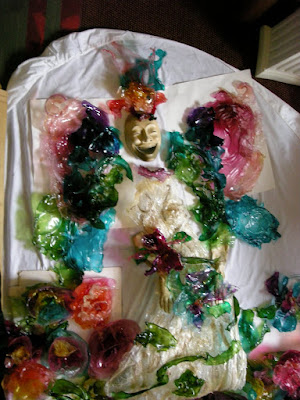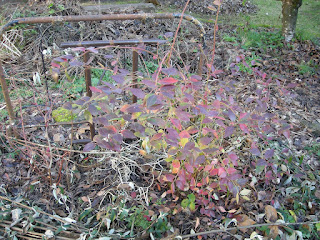
I posted this first image on FB, propagating the rumor that E.C. LeBlanc made this art in the 80's, but nobody caught it or thought it as clever as I did. Oh well. That is the good and bad side of FB scrolls, things move down and out of notice, rather quickly sometimes, which can be a relief. On to the next.
I'm loving the falling snow, we just don't get enough of that down here at sea level. Unfortunately it canceled the panel discussion about SM and OCF Then and Now that we were having tonight at the Lane County Historical Museum. It's rescheduled for March 10. I was looking forward to sorting out those memories from my early days at Market. Maybe this will give me some time to look around at old journals and photos and enhance what I remember.
It's strange to be doing somewhat the same thing but not the same thing at all. I started out in 1975 painting signs, (the new Humble Bagel was my first customer) and gradually changed into a t-shirt artist, covering a lot of area. I tried to make a list of all of the shirt designs I have done, and after several pages decided I would probably not be able to list all of them. I could sort through the boxes of old art; I probably still have it all.
Of course it has not been all about my craft. I've said before that Market made me who I am as I made the Market in return. When I got interested in the early 80's, I was quickly convinced to chair meetings for a few years, and learned all I could about the consensus process. We had a lot of contention at some meetings, which was not so much about real issues as about real personality clashes and lack of communication skills. People so easily get caught up in their fears and the imagined slights and threats and insults and doomed futures. Drama is juicy and hooks us and feeds our emotional needs. Like addictions.
Over the years I have become more adept at identifying bullying behavior and learning how to disengage, but it's sometimes really hard to walk away without righting the situation. I find that I have a great sense of justice that I think is generational.

It blurs the goals and drives passion, but thinking that justice will prevail is just naive. There's no authority figure watching and adding up points to award to a winner. Tactics and tricks may seem to push the situation but usually things get decided as a process, by doing whatever seems best at any point of change. Often those who are responsible for the decision defer, and take the path of least resistance. Justice isn't even discussed; doing what is right is so subjective that people don't always even think about it. They do what seems practical, or something entirely dysfunctional and misguided.
All we can do is keep working for what we think is right, stating our opinions as honestly and openly as possible. Sometimes people "see" us, sometimes not. Can't do a lot except look within and observe reactions. I see a great stubbornness in me when I feel bullied, so I try to retreat and not respond when I think someone is trying to dominate me. I don't respond to "power over."
I think back to my basic understanding of power, that it comes in three forms: Power over, power with, and power from within. I choose to look for and honor power from within, because that is what makes power with, possible. Power over is not an appropriate use of power, and will nearly always fail in the long run, because it seeks to dominate and not to allow the best expression of needs and practical solutions. Such a simple analysis, but not a mainstream one.
Strengthening my inner power is my priority, but that doesn't mean getting rigid and closed. It means seeing fears and what lies behind actions and words, rather than being caught up in feeling righteous or smug. I don't think my work in these areas is hard to see in me. You would think that sitting at a table with me for several years would allow you to see me as I am, not a strategist, not a dominator, but someone who works thoughtfully for what I see as the common good.
Alas, I am human and still have room to evolve further. I don't see what I can't see, just like everyone else. I still have that little people pleaser girl in there, trying to make the adults happier. I still have the freedom I tasted as an independent young person, changing the world and thinking big. I also have years of patience, and solid experience standing on my own two feet, working hard, solving thousands of problems step by step. I have a good solid foundation and can still dream and do ridiculous things like make Jell-O art, elaborate jokes, and be silly in the snowfall.
I also still have the A student, conscientious student government leader in me from high school. Our school was new and we had to write constitutions, guidelines and rules for all of our organizations, and I was in many of them. I began taking minutes back then and have done so for the last 45 years. I'm confident that I do a really thorough job, examining every phrase and word for embedded prejudice, underlying assumptions, and bias. I make sure to phrase everyone else's statements neutrally, trying not to make judgments myself, and trying for a positive light if appropriate. I go over them a few times, working at what vibrates and has tinges of that dramatic light of trickery.

A friend who is also a professional minutes-taker said that she knows she is doing a good job if she gets criticized from both sides. That's a bit of a grim view, but it made me work even harder. Since my interests are wide, I usually do have some involvement with the subjects discussed at the meetings, so it's really important to me to frame things positively without favoring any position. I know I do good work, and it is service, because even when I do get paid, it's not much, and spending several hours at my laptop gives me a pain in my right shoulder. It's service.
And not many people are willing to do it as thoroughly as I do. So I don't expect to quit any time soon.
In other news, I gelatined some ribbons to the wings to see how they might be worn, and it looks like it will work, with some adjustments. And it's snowing.





















